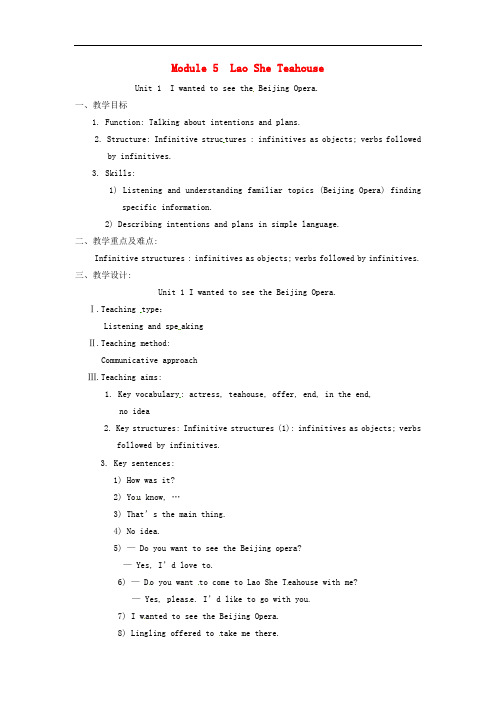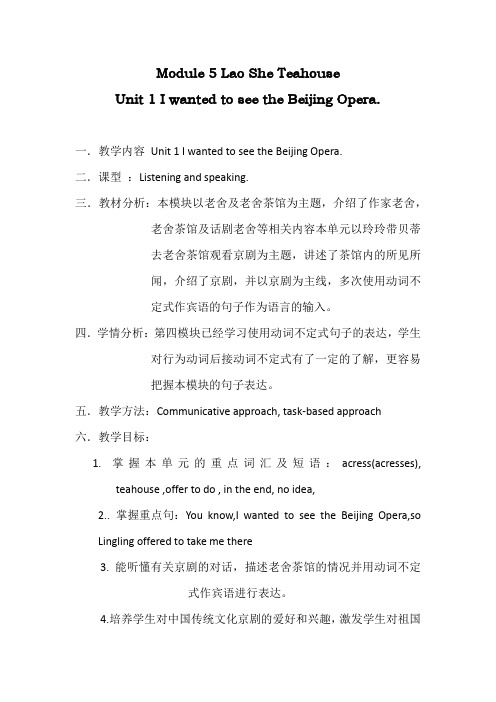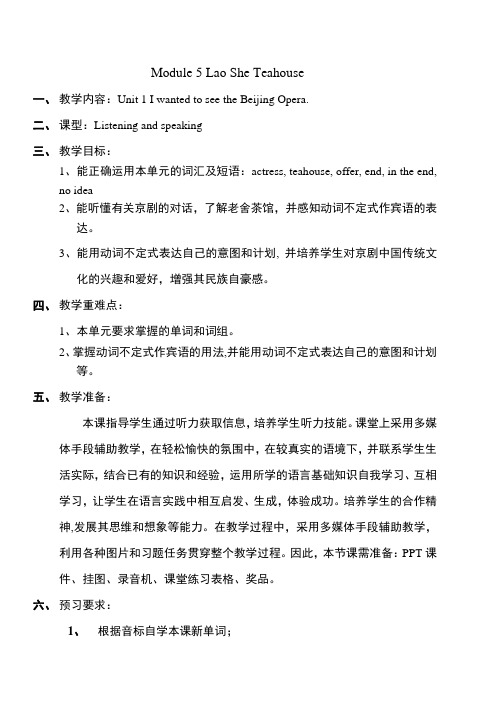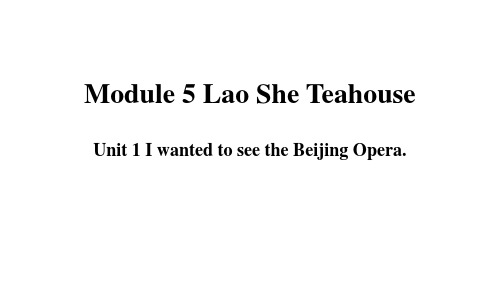初中英语_Module5Unit1IwantedtoseetheBeijingOpera教学设计学情分析教材分析课后反思
人教版英语八年级上册module 5 unit 1 i wanted to see the beijing opera

Module 5 Lao She Teahouse Unit 1 I wanted to see the Beijing Opera. 提纲挈领1. actress n. 女演员【点拨】actress意为“女演员”。
如:As an actress, she is very famous now.作为一名女演员,她现在非常有名。
【延伸】actor n. 男演员2. end n. (时间的)最后一段;末尾 v. 结束【点拨】(1)end作名词时,意为“终点;末尾;尽头”。
如:We didn’t leave until the very end.我们直到最后才离开。
(2)end作动词时,意为“结束;终止”。
如:①How does the story end?这个故事结尾如何?②They ended the play with a song.他们以一首歌曲结束了这出戏。
【延伸】end的常用短语:at the end of在……的尽头,在……的末梢;by the end of到……末为止,在……结束时;in the end最后,终于。
如:①You’ll find a hotel at the end of the street.在这条街的尽头你将发现一家宾馆。
②He came back by the end of the meeting.在会议结束时他回来了。
③In the end, he found his mum.最后他找到了他妈妈。
句型透视1. You know, I wanted to see the Beijing Opera, so Lingling offered to take me there. 你知道的,我想看京剧,所以玲玲主动提出带我去那里。
【点拨】(1)want是动词,意为“想;想要”。
常用于以下结构:1)want sth.想要某物。
如:He wants a book.他想要一本书。
八年级英语上册 Module 5 Unit 1 I wanted to see the Beijing Opera教案 (新版)外研版

Module 5 Lao She TeahouseUnit 1 I wanted to see the Beijing Opera.一、教学目标1. Function: Talking about intentions and plans.2. Structure: Infinitive struc tures : infinitives as objects; verbs followedby infinitives.3. Skills:1) Listening and understanding familiar topics (Beijing Opera) findingspecific information.2) Describing intentions and plans in simple language.二、教学重点及难点:Infinitive structures : infinitives as objects; verbs followed by infinitives.三、教学设计:Unit 1 I wanted to see the Beijing Opera.Ⅰ.Teaching type:Listening and spe akingⅡ.Teaching method:Communicative approachⅢ.Teaching aims:1. Key vocabulary: actress, teahouse, offer, end, in the end,no idea2. Key structures: Infinitive structures (1): infinitives as objects; verbsfollowed by infinitives.3. Key sentences:1) How was it?2) Yo u know, …3) That’s the main thing.4) No idea.5) — Do you want to see the Beijing opera?— Yes, I’d love to.6) — D o you want to come to Lao She T eahouse with me?— Yes, pleas e. I’d like to go with you.7) I w anted to see the Beijing Opera.8) Lingling offered to take me there.Ⅳ. Teaching aids:Tape recorder, PPTⅤ.Teaching StepsStep 1. Warming-up1). Show some pictures.2). Look at the pictures, and say something about the pictures.3). Introduce the new words.4). Talk about Lao She Teahouse and Lao She.Step 2. Work in pairs.Ask and answer about what you can do at Lao She Teahouse in pairs.Step 3. Listening practice.1. Ask the students to listen to the tape and then fill in the blanks. (L:Lingling B: Betty)L: Hi, Betty.B: Hi, Lingling. I’d _____ to see the traditional Beijing Opera.L: Do you want to come to Lao She ______ with me?B: What’s Lao She Teahouse?L: You can ______ ______ the Beijing Opera there and _____ ______at the same time.B: Yes, please. I’d like to go with you. You can tell me what’s happening. L: Yes, it’s quite __________ to understand the story. Just watch the actors and actresses, listen to the music and try to _______ it.2. Check the answers:Step 4. Listening practice.1.Listen and finish the ex ercises.1). Why did Lingling take Betty to the teahouse?Because she ______ ______ see the Beijing Opera.2). What did Betty and Lingling do at the teahouse?They drank ______ and ______ an opera .3). How long did Lingling and Betty plan to watch the traditional BeijingOpera?A. For an hourB. for two hoursC. For three hours2. Check the answers:Step 5. Reading time:1. Read the conversation and choose the correct answers.1). Betty and ____ went to Lao She Teahouse last night.A. TonyB. LinglingC. Be tty2). Betty ho pe to _______ ne xt time.A. understand moreB. understanding moreC. understand less3). — How long did they stay in the end? — They stayed for ___. A. 3 hours B. 2 hours C. 1 hour4). Lao She is a(n) ________A. great actorB. great waiterC. great writer2. Read the conversation again and find out infinitives.3. Ask the students to read the conversation again and then complete thepassage.Betty’s BlogThe visit to the Lao She TeahouseLingling and I went to Lao She Teahouse last night. I wanted ________ the Beijing opera, so Lingling __________________ me there,we drank tea and _______ an opera . I t is hard for me __________________ , but the actors and actresses are ____________. At first, we planned _____________ for an hour, but in the end, we stayed ____________________. The main thing is that it was ______________, I hope_________________________ next time. Because the tea house is very famous, I asked Lingling ___________ me there. Lingling told me that Lao She is a famous ________, and he ___________________ his play Teahouse. We really had ______________________.4. Check the answers.5. Read the passage by themselves.Step 6.Summary:Step 7 H omework:Writing:假如你昨天参加了你的朋友Bill的生日聚会,而且是你的另一个朋友Jerry主动提出带你去的,设定一个过生日的情景,自编一段对话,尽可能多的用动词不定式。
初中英语_ Module5Unit1IwantedtoseetheBeijingOpera教学设计学情分析教材分析课后反思

Module 5 Lao She TeahouseUnit 1 I wanted to see the Beijing Opera.一.教学内容Unit 1 I wanted to see the Beijing Opera.二.课型:Listening and speaking.三.教材分析:本模块以老舍及老舍茶馆为主题,介绍了作家老舍,老舍茶馆及话剧老舍等相关内容本单元以玲玲带贝蒂去老舍茶馆观看京剧为主题,讲述了茶馆内的所见所闻,介绍了京剧,并以京剧为主线,多次使用动词不定式作宾语的句子作为语言的输入。
四.学情分析:第四模块已经学习使用动词不定式句子的表达,学生对行为动词后接动词不定式有了一定的了解,更容易把握本模块的句子表达。
五.教学方法:Communicative approach, task-based approach六.教学目标:1. 掌握本单元的重点词汇及短语:acress(acresses),teahouse ,offer to do , in the end, no idea,2.. 掌握重点句:You know,I wanted to see the Beijing Opera,soLingling offered to take me there3. 能听懂有关京剧的对话,描述老舍茶馆的情况并用动词不定式作宾语进行表达。
4.培养学生对中国传统文化京剧的爱好和兴趣,激发学生对祖国传统文化的热爱。
教学重难点:1.掌握本单元的重点单词及词组。
2.掌握动词不定式的用法并复述对话内容。
本节课需准备:ppt课件,挂图,课堂练习及奖品。
八.教学过程:教学步骤:Step 1: Warming-up and Lead in (Activites1,2)1. Greet the students as usual.2. Show a video and talk about it, then lead in the title.T: What is it about? Ss:……..(用京剧及老舍,老舍茶馆图片引入本节课的主题,预先了解本节课内容,活跃了课堂气氛调动了学生的学习兴趣)Step 2 : Pre-listening:1. Show some pictures about Beijing Opera and teahouse. Talk about the new Words: actress, dance , music , play , sing, teahouse , theatre, traditional2. Let the students read the new words together and check them.3. Free talk : Work in pairs and talk about the pictures using the new words.Step 3 : While Listening:1. Play the tape, ask students to listen and underline the correct wordsor expressions. Then check the answers.2.Listen to the conversation and check the true sentences.Step 4 : Reading1.Ask the students to read the conversation and check the answers. (Activity 3)2.Read the conversation with the tape then answer some questions.3. Ask the students to work in groups and act out the conversation.4.Retell the conversation according to the mind map.Step 5 : Post reading1. Work in groups : Ask the students to talk about plans of May DayWhere will they go and talk about the place that they goUse the “offer/plan/decide/to do”help you.(小组合作,给出关键词,通过描述计划既加深知识点的输出课文的掌握,同时也提高了口语的表达能力。
Module5Unit1IwantedtoseetheBeijingOpera教案

5.文化了解:通过学习北京京剧,了解中国传统文化,培养跨文化交际意识。
课程设计将围绕以上内容,结合学生的实际情况,以提高学生的英语听说读写能力和跨文化交际能力为目标。
二、核心素养目标
《Module 5 Unit 1 I wanted to see the Beijing Opera教案》
4.学习能力:激发学生的学习兴趣,引导学生自主探究和合作学习,培养其独立解决问题的能力,提高学习效率。
三、教学难点与重点
《Module 5 Unit 1 I wanted to see the Beijing Opera教案》
1.教学重点
(1)新词汇的掌握:课程中的新词汇如Beijing Opera, mask, character等是本节课的核心内容,教师需引导学生正确发音、理解词义,并能够熟练运用;
在实践活动方面,我发现学生们在角色扮演活动中表现出了很高的热情,但也存在一些表演上的不足。针对这一点,我打算在接下来的课程中,加强对学生表演技巧的指导,如发声、表情和动作等,以提高他们的表演水平。
此外,课后我收到了一些学生的反馈,他们表示在课堂上学到的京剧知识让他们对传统文化有了更深的认识。这让我意识到,在教学中融入文化教育的重要性。因此,我将在今后的教学中有意识地加入更多关于中国传统文化的内容,培养学生的民族自豪感。
举例:学生能够正确运用词汇描述京剧中的角色和面具。
(2)重点句型的运用:掌握重点句型如I wanted to see...,I expected...,I thought...等,并能结合实际情境进行对话练习;
举例:学生能够运用重点句型表达自己对京剧的期待和观后感。
初中英语外研版八年级上册《M5 Unit 1 I wanted to see the Beijing

Module 5 Lao She Teahouse一、教学内容:Unit 1 I wanted to see the Beijing Opera.二、课型:Listening and speaking三、教学目标:1、能正确运用本单元的词汇及短语:actress, teahouse, offer, end, in the end,no idea2、能听懂有关京剧的对话,了解老舍茶馆,并感知动词不定式作宾语的表达。
3、能用动词不定式表达自己的意图和计划, 并培养学生对京剧中国传统文化的兴趣和爱好,增强其民族自豪感。
四、教学重难点:1、本单元要求掌握的单词和词组。
2、掌握动词不定式作宾语的用法,并能用动词不定式表达自己的意图和计划等。
五、教学准备:本课指导学生通过听力获取信息,培养学生听力技能。
课堂上采用多媒体手段辅助教学,在轻松愉快的氛围中,在较真实的语境下,并联系学生生活实际,结合已有的知识和经验,运用所学的语言基础知识自我学习、互相学习,让学生在语言实践中相互启发、生成,体验成功。
培养学生的合作精神,发展其思维和想象等能力。
在教学过程中,采用多媒体手段辅助教学,利用各种图片和习题任务贯穿整个教学过程。
因此,本节课需准备:PPT课件、挂图、录音机、课堂练习表格、奖品。
六、预习要求:1、根据音标自学本课新单词;2、查找相关资料,找出你认为本课较重要的语言点和短语。
七、教学过程:达标训练题一、单项选择()1. He stayed at home for ________ hour.A. aB. anC. theD. \()2.The old man was badly ill and we _____ him _____ hospital right away.A. take; toB. bring; toC. took; toD. brought ; to ()3. It is difficult for the boy _______ English well.A. learnB. learnsC. to learnD. learning()4. –Don’t forget _______ your homework.- OK. I’ll do it right now.A. doingB. doC. to doD. did()5. Would you please show me the way _________ the bank?A. inB. forC. withD. tot二、根据汉语完成句子,每空一词。
初中英语外研版八年级上册Module5Unit1IwantedtoseetheBeijingOpera教学设计

初中英语外研版八年级上册
Module5Unit1IwantedtoseetheBeijingOpera教学设计
【名师授课教案】
1教学目标
1.知识目标
1)正确使用以下单词:
Actress, teahouse, offer, end, traditional, theatre
2)理解下列词组:offer to do, in the end, no idea.
3) 语法:感知动词不定式做宾语的用法
2.技能目标
能够听懂有关京剧的对话,了解老舍茶馆并感知动词不定式作宾语的表达方式,能简单描述自己的意图和计划
3.情感与文化目标:
热爱京剧、话剧等中国传统文化,增强民族自豪感。
2学情分析
八年级学生有游览名胜古迹的经历,参观老舍茶馆他们比较感兴趣,能积极表达自己的意图。
3重点难点
1.理解并掌握本单元的重要的单词及短语。
2.理解并会运用动词不定式作宾语的用法。
4教学过程
4.1第一学时
教学活动
1【讲授】module5 unit1
二、教学过程
教学步骤:
Step one: lead in
Look at a picture of Laoshe Teahouse. Can you say something about it? What can people do there?
Learn the new words: teahouse, traditional, theatre actress, offer, end,…
【设计意图】:通过老舍茶馆的图片导入新课,了解老舍茶馆,并教授本课生词。
Step two: listening。
Module5Unit1IwantedtoseetheBeijingOpera.知识点课件英语八年级

(1)作动词,意为"结束;终止"。①end with+具体名词(a song/dance等) 以……结束(强调方式)②end in+抽象名词(failure/divorce等) 以……结束(强调结果)
(2)作名词,意为"(时间、事件等的)结局;末端,尽头"。①the end of ……的末尾②at the end of 在……尽头/结束时(可表示地点或时间)③by the end of 到……末为止(常表示时间)
语境串记He asked the kids to find several keys in the house at the end of the road by the end of 11:00. In the end, only one kid finished the task.他要求孩子们在11点之前找到放在路尽头的那所房子里的几把钥匙。最后,只有一个孩子完成了任务。
A
【解析】句意:——在过去的五年内,中国在"一带一路"中扮演着重要角色。——它给很多国家提供了一个交流的好机会。offer"提供",support&#;导演"。由语境可知选A。
教材语境 But the actors and actresses were excellent. 但是男女演员都很出色。(教材P34)
教材语境 You know,I wanted to see the Beijing Opera,so Lingling offered to take me there. 你知道的,我想看京剧,所以玲玲提出带我去那里。(教材P34)
you know 你知道的
常用于口语,用来对某事进行解释,表达自己的看法或提供更多的信息。
外研版-英语-八上-Module5 1单元 I wanted to see the Beijing

八年级-英语-打印版Module 5 Lao She TeahouseUnit 1 I wanted to see the Beijing Opera 1.学习目标:(1)掌握以下重点词汇:actress, teahouse, offer, in the end, no idea(2)倾听特定的信息(一)课前自主预习Task I Do you want to know sth about “Beijing Opera”?鼓励学生多渠道找有关“京剧”的信息。
Task II Talk about the following questions:1、Who is Lao She?2、What do you know about him?3、Have you ever heard of his play Teahous?4、What do you think people can do in Lao She Teahouse?Task III Words and phrases1.__________ (男演员2.__________ (女演员)3. __________ (访问者)4.__________ (发明家)5.__________(提议、主动给予)翻译词组1.想要做某事2. 因….而著名3.喝茶4. 希望做某事5.看京剧 6. 主动提出做某事计划做某事8. 最后(二)课堂拓展延伸Fill in the brank with the proper form of the given word.1.Mary asked me __________ (wait) for her at the cinema.2.Tom enjoys _________ (listen) to the pop songs.3.It is not easy _________ (learn) a foreign language.4.John agreed _________ (get) someone to help us.5.Mother told her son _________ (not play) football in the street.6.Would you like __________ (come) with me?7.Should I __________ (go) home now?8.Your duty is __________ (clean) the corner of the garden.9.I’m glad __________ (see) you again.10.He needs __________ (buy) a new bike.八年级-英语-打印版。
- 1、下载文档前请自行甄别文档内容的完整性,平台不提供额外的编辑、内容补充、找答案等附加服务。
- 2、"仅部分预览"的文档,不可在线预览部分如存在完整性等问题,可反馈申请退款(可完整预览的文档不适用该条件!)。
- 3、如文档侵犯您的权益,请联系客服反馈,我们会尽快为您处理(人工客服工作时间:9:00-18:30)。
Module_5_Unit_1_ 教案主备人:_____
小组评价积分表(组长记录)
本单元主要学习动词不定式的用法,对学生来说比较简单,也比较容易掌握。
重要的是在实际语言情境中的灵活运用。
在英语中,并不是所有的动词在连用的时候都采用“动词+不定式”的形式。
一般来说,用不定式时,所表示的多为将来的行为。
但是,在具体使用中还要注意记忆,因为动词不同,对其后动词的形式要求也不同。
常见的后面接“to+动词原形”作宾语的动词有plan, decide, want, hope, offer, try, like, love, learn等。
如果教材内容处理不当,会导致学生有话想说,却无法用英语来表达的尴尬场面。
因此在具体安排教学内容时,应注意适当降低难度与要求,通过开展生动有趣的活动将知识深入浅出的传授给学生。
在教学过程中,注重贯彻动词不定式的用法。
学生在语文课中已经学过关于老舍及《茶馆》,通过本节课的学习学生更加了解了关于中国传统文化的一些知识,通过播放老舍茶馆
的视频,调动了学生的学习积极性,激发了学生的学习兴趣。
同时学生们也学习了这些知识的英文表达方式,更加体现了英语新课标中英语工具性与人文性相统一的课程目标,这样的课程标准更加激发了学生学习英语的乐趣。
本模块以老舍及老舍茶馆为主题,旨在让学生了解像老舍这样的在中国文坛中有着重要影响的作家及京剧、话剧等中国传统文化。
通过一系列活动,让学生练习动词不定式的用法。
本单元的对话以玲玲带贝蒂前往老舍茶馆看京剧为主题,讲述了贝蒂在茶馆内的所见所闻。
对话以谈论中国的国粹-京剧为主线,穿插使用了动词不定式作宾语的句子,教学情境自然生动,有利于激发学生对祖国传统文化的热爱。
教学中使用图片及音视频资料可以丰富学生的直观感受。
一、根据句意用括号内所给词的适当形式填空
1.The boys decided ________ (play) basketball after school.
2.My father planned ________ (stay) in Beijing for two days.
3.The girl often goes ________(watch) the magic show.
4.He offered ________(get) someone to help us.
5.I told him ________(not play) in the street.
6.Would you like ________(come) with me?
7.Your task is ________(find) the cost of the hotel.
二、翻译句子
1. 我想去看京剧。
(want to do)
__________________________________________________
2. 你经常去看京剧吗?(go to see)
__________________________________________________
3. 我希望下次理解的更多。
(hope to do )
__________________________________________________本单元的内容是关于老舍茶馆的知识,学生比较感兴趣。
教师通过帮助学生创设一些情境,让学生在具体的情境中练习动词不定式的用法。
教师也可以放手让学生自己创设情境编对话,要求对话中尽量使用动词不定式,而不要限制学生的思维。
此外,教师可以多运用小组合作探究的方式,培养学生相互协作的能力,调动学生的学习兴趣,培养学生的逻辑思维和创造能力,激发学生对祖国传统文化的热爱。
英语课程的学习,既是学生通过英语学习和实践活动,逐步掌握英语知识和技能,提高语言实际运用能力的过程;又是他们磨砺意志、陶冶情操、拓展视野、丰富生活经历、开发思维能力、发展个性和提高人文素养的过程。
英语课程的目的在于发展学生综合语言运用能力,培养学生良好的道德品质和社会适应能力,以及科技创新和跨文化人才。
也就是说英语课程不再是单纯的工具性课程,而是具有工具性和人文性双重性质的课程。
英语学习不再是简单地提升学生的综合语言运用能力,还
承担着提高学生综合人文素养的任务。
本模块以老舍茶馆为背景引入动词不定式的用法,既体现了英语的工具性,又体现了其人文性,讲教材与新课程标准很好的结合在了一起。
